
Publisher:
Bonnie King
CONTACT:
Newsroom@Salem-news.com
Advertising:
Adsales@Salem-news.com

~Truth~
~Justice~
~Peace~
TJP
Sep-22-2006 14:37

 TweetFollow @OregonNews
TweetFollow @OregonNews
Book Review: Eugene Bullard - Black Expatriate in Jazz-Age Paris
Book Review by Tim King Salem-News.comThe story of the only black fighter pilot in WWI.
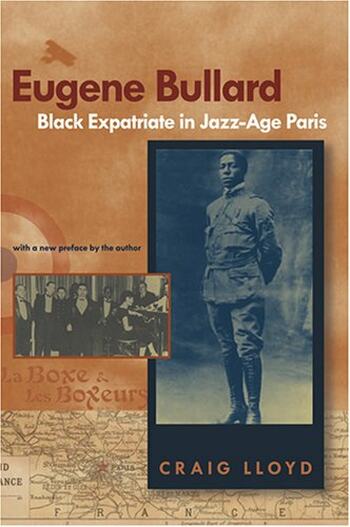 Photos: af.mil, allenscreations.com |
(SALEM) - The plight of World War One’s only African American pilot has a lesson for every living soul. Eugene Bullard, the son of a slave, made his dreams take flight long before the first time he soloed in a biplane, and no amount of interference or meddling was ever enough to bring him down.
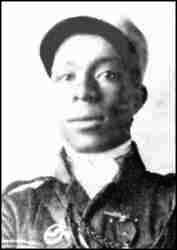 Author Craig Lloyd has brought this great aviator and hero of France back to life, where his legacy is finally allowed an opportunity to shine in all of its greatness, against all of the adversity that was his.
Author Craig Lloyd has brought this great aviator and hero of France back to life, where his legacy is finally allowed an opportunity to shine in all of its greatness, against all of the adversity that was his.
Comprehending the racial fury of the American post Civil War Deep South literally takes something away from a person. It didn’t end with the abolishment of slavery by any means, and even though Columbus, Georgia wasn’t the worst in terms of racial violence, the city and state maintained plenty of policies that were designed to keep black people downtrodden and poor, hungry and undereducated.
Lloyd’s book emerges you into this culture, where Bullard’s parents maintained their own segregation program initially, barring Eugene from playing with neighboring white children for the first few years. As school began, so did the racial taunts that the white youngsters were taught in their homes.
But the first years would prove to be insulating, because ignorance can truly be bliss, and perhaps they are what gave him the strength to go into the world and carve out a place that is one of the most unique among American military heroes. For his first few years, Eugene Bullard had not the slightest idea he was different from anyone else.
Bullard’s father was one fourth Native American, and he worked hard to feed his children and care for them. He knew and had connections with white people in Georgia who lived above the fray; people who perhaps played the racist game just enough to survive, while making life better for African Americans.
Two things that his father, William Bullard, found important were a love of education, and affection for Europe and particularly, France. He told Eugene that people in France were not prejudice, that blacks were respected and that national laws were not created to allow prejudice. In the United States, the depraved policies of utter and extreme national racism haunted Eugene Bullard. As a boy, he ran away from home and eventually left for France to escape those injustices, found success, and then suffered again when the United States entered the war.
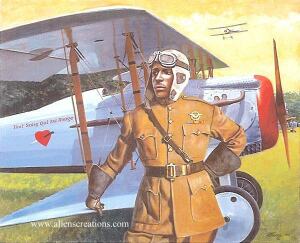 Even though the United States never allowed him to serve, all who knew him in his adopted country of France knew who Bullard was. He was the American who associated with the world’s top boxers, people like Jack Johnson who had their titles removed because they were black. Craig Lloyd introduces his readers to numerous African Americans who lived in France in the early 1900’s. Their struggles were minimized when they crossed the Atlantic.
Even though the United States never allowed him to serve, all who knew him in his adopted country of France knew who Bullard was. He was the American who associated with the world’s top boxers, people like Jack Johnson who had their titles removed because they were black. Craig Lloyd introduces his readers to numerous African Americans who lived in France in the early 1900’s. Their struggles were minimized when they crossed the Atlantic.
After working as an entertainer and boxer in Europe, Bullard joined the French Foreign Legion at the onset of WW1 in 1914. His physical prowess, knowledge of multiple languages, and courage would power Eugene through the first years of the war. He was a trench soldier, dealing with some of the most deadly battles of the war like Verdun in 1916. Bullard was awarded many of France’s highest honors before receiving severe injuries in combat that would require six months of convalescent leave.
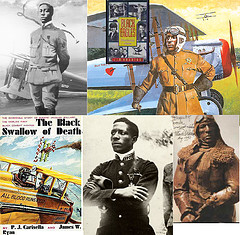 Later, Bullard requested pilot training and eventually became a member of the infamous Lafayette Escadrille squadron of American flyers for France. Bullard would find the highest disservice yet, when the Americans entered the war and barred him from serving.
Later, Bullard requested pilot training and eventually became a member of the infamous Lafayette Escadrille squadron of American flyers for France. Bullard would find the highest disservice yet, when the Americans entered the war and barred him from serving.
Sadly, it is a man known for many great acts that pursued Bullard ruthlessly. Dr. Henry Gros was the founder of the Lafayette Escadrille and the American Ambulance Crops. Despite his accomplishments that helped bring France eventual victory, he was a wanton racist who went to great lengths to deny Eugene Bullard what he had earned.
France for the record never had slavery. Servitude was banned in its colonies in 1848, and African Americans lived as respected people as far back in France as the 19th Century.
While Craig Lloyd’s book is about Eugene Bullard, it is for me a tool that allows a much broader understanding of relations between France and the United States. The French General Marquis De Lafayette was an abolitionist. American press while quick in recent years to judge France for not joining the U.S. invasion of Iraq, fails to reference why there is a United States at all.
 The reason Americans rushed to fight for France in 1917 is because the exact same thing happened in 1776, when French troops came here to help us defeat the British. But American policy in World War One was literally wrapped around prejudice, and the length that American officers went to in order to find fault in the black soldiers who served with dignity and devotion is extraordinary.
The reason Americans rushed to fight for France in 1917 is because the exact same thing happened in 1776, when French troops came here to help us defeat the British. But American policy in World War One was literally wrapped around prejudice, and the length that American officers went to in order to find fault in the black soldiers who served with dignity and devotion is extraordinary.
Bullard talked about entering a restaurant in Paris and seeing the resentment in white officers who immediately got up. He then looked toward a table of French officers who nodded and asked him to join them. Bullard was a corporal, but he was a French Chasse Pilot, and everyone respected him, except his own, on most occasions.
French resentment toward Americans today, is largely based on our country’s attempts to force a racist policy on their nation from 1917 to 1919. Paris is where most of it happened. And while all of this was going on, black Americans gave birth to the entire jazz movement in France. A jazz band from the 15th New York Infantry had what it took to bring an entire style of music and dance to France, and it stuck like glue.
It seems natural that Eugene Bullard, the runaway, the entertainer, the boxer, the decorated hero and pilot, would learn to play music. The years following WW1 were his best, and Eugene Bullard became a jazz club owner and friends with people like Louis Armstrong, Roscoe “Fatty” Arbuckle, and the Prince of Whales Edward Windsor.
But the Nazi invasion spelled an end for Bullard's jazz years in France. Wounded while fighting with the French Underground, Bullard was evacuated and sent back to the United States where he eventually recovered from the injuries suffered at hands of the Germans.
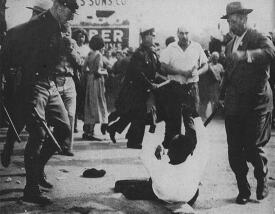 Bullard's racist beating at Peeksill in '49 |
His death in the early 1960’s in New York was something that most of America never noticed. But the French military sent it’s highest order overseas to provide their national hero an officer’s burial of the highest order. They never forgot this man who did so much for his love of his own nation, and his adopted country.
I strongly suggest picking up a copy of Lloyd’s book. It is a intriguing look at the Jazz-Age from a different perspective, and a compelling lesson in the history of the Paris music scene.
Eugene Bullard- Black Expatriate in Jazz-Age Paris is full of fascinating encounters with people of great fame and diversity, the heroism it documents is astounding and rare, and the inspiration and knowledge of many things that play a role in today’s world are crucial toward a complete understanding of an African/American quest for freedom and equality.
==========================================================
Related story on Salem-News.com
Movie Review:The Flyboys Shoots Myths About WW1 Pilots Down in Flames Movie Review:The Flyboys Shoots Myths About WW1 Pilots Down in Flames
------------------------------------------------------------
This article was originally written and published September 22, 2006 by Tim King
-----------------------------------------------------
 Tim King is a former U.S. Marine with twenty years of experience on the west coast as a television news producer, photojournalist, reporter and assignment editor. In addition to his role as a war correspondent, this Los Angeles native serves as Salem-News.com's Executive News Editor.
Tim King is a former U.S. Marine with twenty years of experience on the west coast as a television news producer, photojournalist, reporter and assignment editor. In addition to his role as a war correspondent, this Los Angeles native serves as Salem-News.com's Executive News Editor.
Tim spent the winter of 2006/07 covering the war in Afghanistan, and he was in Iraq over the summer of 2008, reporting from the war while embedded with both the U.S. Army and the Marines. Tim holds numerous awards for reporting, photography, writing and editing, including the Oregon AP Award for Spot News Photographer of the Year (2004), the first place Electronic Media Award in Spot News, Las Vegas, (1998), Oregon AP Cooperation Award (1991); and several other awards including the 2005 Red Cross Good Neighborhood Award for reporting. Serving the community in very real terms, Salem-News.com is the nation's only truly independent high traffic news Website, affiliated with Google News and several other major search engines and news aggregators.
You can send Tim an email at this address: newsroom@salem-news.com
Articles for September 21, 2006 | Articles for September 22, 2006 | Articles for September 23, 2006

Quick Links
DINING
Willamette UniversityGoudy Commons Cafe
Dine on the Queen
Willamette Queen Sternwheeler
MUST SEE SALEM
Oregon Capitol ToursCapitol History Gateway
Willamette River Ride
Willamette Queen Sternwheeler
Historic Home Tours:
Deepwood Museum
The Bush House
Gaiety Hollow Garden
AUCTIONS - APPRAISALS
Auction Masters & AppraisalsCONSTRUCTION SERVICES
Roofing and ContractingSheridan, Ore.
ONLINE SHOPPING
Special Occasion DressesAdvertise with Salem-News
Contact:AdSales@Salem-News.com

Salem-News.com:
googlec507860f6901db00.html

Terms of Service | Privacy Policy
All comments and messages are approved by people and self promotional links or unacceptable comments are denied.
Furgman October 21, 2009 1:44 pm (Pacific time)
Remarkable story, even more remarkable is how I got the DVD. I was looking for Tuskegee airman CD's and this popped up. I did not see the cover well but bought it. I thought it was a typical fly boy movie until I seen who was in it, it made me proud to actually see the first black aviator (military ) in action.
Frank November 28, 2007 7:39 pm (Pacific time)
Your article and the movie are both very uplifting. It's a pleasure to see a movie that tells it like it was,and not white washed as with the Redball Express having all white drivers, or all cowboys being white
Henry Ruark November 13, 2007 6:13 am (Pacific time)
Tim et al: Remember my "war"-story re black sergeant driving for deep Southern combat pilot, both working recruitment outta Bsn 1st Service hq ? Pilot was unabashed racist, we visiting h.s. in New England to recruit; when I left assignment, made sure my black friend took over with pilot as replacement driver. Understand "it happened" soon-after, with "hot"-pilot literally lifted out of seat via throat. NO charges ever filed !!,and pilot shipped out fast after continued protests.
Tim King February 4, 2007 8:36 pm (Pacific time)
Ernie, That is fantastic isn't it? In the movie they state that he went on to become the first black air mail pilot, as we know that isn't the true story, but at least they stated "based on" in regard to the connection to real history. I was also happy with the movie's portrayal of Eugene and I agree in giving Hollywood the nod. Of course they have nearly every German flying a bright red Fokker triplane and that is more than a bit off, but it is what our Snoopy cartoon strip-inspired culture has been raised with when it comes to WW1. Glad you enjoyed the story.
ernie barnes February 4, 2007 7:59 pm (Pacific time)
I've heard the name"Black Swallow of Death" years ago,when describing the former TodayShow doorman,whom,i was told,was a Black fighter pilot for the French in WW1.It is of such a rewarding experience to confirm this great man's identity once and for all,that his story,"his-story",will be one that I will pass on to my students and family.Hollywood,for once,has done a service to history,instead of ignoring,re-writing,or even abusing it,as was done in Clint Eastwood's"Bird",or HBO's abysmal"Tuskeegee Airmen".I actually bought"Flyboys" to see how the writers spun in a Black aviator,and was knocked over to learn the actual truth!
dominic rowe December 14, 2006 5:43 am (Pacific time)
it was very good. it had alot of good pictures and things
sue October 24, 2006 11:05 am (Pacific time)
i was filled after reading the history of such strong,brave,gifted and intelligent man.it was up lifting and inspiring.i will pass this on to my grand children,they should know about our real roots and how they came about and about the great men and women of our african heritage,again i thank you, i will be traveling to paris soon.
Ron October 2, 2006 11:36 am (Pacific time)
inspiring story about a great man.
[Return to Top]©2025 Salem-News.com. All opinions expressed in this article are those of the author and do not necessarily reflect those of Salem-News.com.